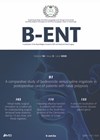
Journal Reviews archive for 2022
Biologics for deafness
Cochlear implants and hearing aids are inherently limited in their ability to restore ‘natural’ hearing. Biological therapy to treat inner ear pathology still is evolving rapidly with several ongoing clinical trials, though none are available for clinical practice to date....
Early results of the Cochlear Osia (active transcutaneous bone-conduction implant) in teenagers
This funded research trial involving 14 adolescents, aged 10 to 17 years, in the Toronto Hospital for Sick Kids was carried out just prior to the new Osia implant obtaining FDA approval for use in the USA. The majority had...
Take a breath between mouthfuls
Pulse oximetry provides a measure of the percentage of oxygen in the blood. The usual range of readings on pulse oximetry is 97-99%. Older people may have lower pulse oximetry readings than younger people, and young women have higher readings...
Doing it for yourself: self-management in speech and language therapy
People with stroke aphasia are traditionally discharged from speech and language therapy when they have plateaued; meaning they are making no further progress in language recovery. This service model has been problematic, leading to people being discharged when they are...
Complications associated with intra-tympanic steroid injections for sudden sensorineural hearing loss
Around 15,000 people in the UK experience a sudden sensorineural hearing loss (SSNHL) each year, and in the majority of cases the cause is unknown. Treatment options for idiopathic SSNHL include various modalities of steroid treatments which have known limitations...
Age is not an issue in sinus surgery
We have an increasingly aged population, and hence older and older patients are presenting with sinonasal issues and the potential need for endoscopic sinus surgery (ESS). The authors sought to identify if older patients (age >70) have more complications post...
Impact of delaying otologic surgery
In this Belgian study, the authors looked at the impact of delaying otologic surgery by sending an online survey to 44 adult patients diagnosed with benign ear pathology whose surgery was postponed due to the COVID-19 pandemic. The questionnaire was...
Eosinophilic or not eosinophilic: dupilumab seems to work
Chronic rhinosinusitis with nasal polyps (CRSwNP) is a type 2 inflammation with interleukin (IL)-4, IL-13, and IL-5. Tissue eosinophilia in nasal polyps dramatically increased over a 10-20-year period. Classification of the severity of eosinophil status is expected to lead to...
Training people with Parkinson’s disease and their partners to have better conversations
Parkinson’s disease is predominantly considered a motor disorder, impacting speech, particularly voice volume, amongst other physical functions. Language and cognitive difficulties, such as difficulties in word finding and social pragmatics are also a key feature of Parkinson’s disease. Given the...
A more comprehensive management for eosinophilic chronic rhinosinusitis after FESS
In recent years there has been increasing recognition of eosinophilic chronic rhinosinusitis which, in particular, results in persistent symptoms and recurrence of nasal polyps, even after FESS surgery. It therefore calls for measures adjuvant to FESS to stop persistence of...
Molecular and genetic nature of skull base tumours drives management
This article reviews the molecular basis and paradigm shift in the diagnosis and management of skull base tumours. It is now known that the phenotype of meningiomas is influenced by their genotype. Endolymphatic sac tumours are observed in up to...
How can we manage children with poor speech discrimination but with normal audiogram
We often come across children and young adults brought in for consultation for suspected hearing loss and having hearing difficulty in noisy backgrounds but who often have normal audiograms. Such patients are suspected to have auditory neuropathy. The term auditory...
















